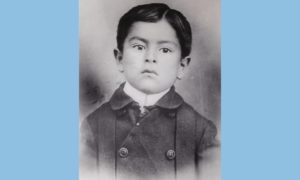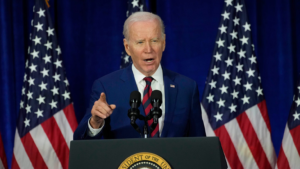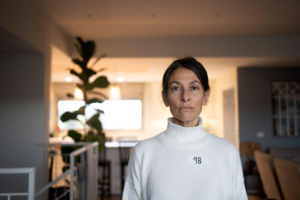American classrooms have been thrust into the debate about race and our country’s history.
WBUR is a nonprofit news organization. Our coverage relies on your financial support. If you value articles like the one you’re reading right now, give today.
“This notion that somehow history is supposed to be employed to make people feel good, it’s disturbing, but it is for some people,” David Blight says. “It’s what’s at stake here.”
How should educators be teaching the history of slavery?
“We have to have an honest history that is honest all the way through, even as it is also cultivating civic bonds and civic connections,” Danielle Allen says.
Today, On Point: How American educators can better teach the history of slavery.
Guests
Danielle Allen, political philosopher. Professor and director of the Edmond J. Safra Center for Ethics at Harvard University. (@dsallentess)
David Blight, professor of history, African American studies and American studies and director of the Gilder Lehrman Center for the Study of Slavery, Resistance and Abolition at Yale University. Author of “Frederick Douglass: Prophet of Freedom,” which won the 2019 Pulitzer Prize in History. (@davidwblight)
Also Featured
Giani Clarkson, social media specialist and former Social Studies teacher at Paul Public Charter School in Washington, D.C.
Cheryl Anne Amendola, 5th and 8th grade Social Studies and History teacher at Montclair Kimberley Academy in Montclair, N.J.
Lois MacMillan, high school World History, American History and American Civil War teacher in Grants Pass, Oregon.
Interview Highlights
On teaching about slavery in American classrooms today
Danielle Allen: “It’s an incredible thing that we have the chance to do so much now that wasn’t possible when I was a kid. I will just start by saying that. … When I was a kid, seven-year-old, eight-year-old. I used to ask my teachers, you know, what was lifelike for enslaved people? They would all say, well-intentioned as they were, we can’t tell you, Danielle. We don’t know.
“So, I definitely went through school with a kind of curiosity and a wonder that wasn’t satisfied. We now have, thanks for the great work of people like David Blight. In fact, so many incredible narratives available. So many other folks have dug through the archives. So, for me, a really important thing is we can now really teach the history of enslavement in the voices of, with materials written and articulated by people who were enslaved or who found their way to freedom. So primary sources is sort of job number one, and in particular telling the story from the voices of the perspectives of the people who actually experienced enslavement is job number one.”
On professional development for educators
Danielle Allen: “My school did not celebrate Black History Month, and so my dad encouraged me to ask the school for a bulletin board and to do my own Black History Month presentations, which I did. I got a bulletin board and the sort of dustiest, darkest, most untrodden quad in the school was the only one left, but at least it was better than nothing.
“And so I did a post about Frederick Douglass. Ida B. Wells, Mary McLeod Bethune and so forth. So I really resonate with the ways in which our families have carried on these histories and given us that breadth of knowledge. So your question about educators is in some sense, how can we make sure that all educators have access to a whole array of knowledge that some of us have been fortunate to get through our families over generations. Professional development is really key.
“When you look around at educational policy right now, when you look [at] policy around civic learning or history and the like and supporting excellence in that, a number one plank in the policy is investment and professional development for educators. Educators need time. They need to be able to sit at institutes … and really take in all the history. There’s a lot of catch-up learning, honestly, that we all broadly need to do. The other piece of it is helping people really think about how to navigate the emotional complexity of a subject like enslavement.
“I love something called the Compass for Courageous Conversations by Glenn Singleton. It makes the point that we all approach material from different perspectives, some with head and analytical questions, some with the heart and emotional reactions, some with the spirit wanting to go straight to evaluation and moral judgment, and some with hands getting ready to take action, asking what we can do. So enslavement is a topic like that where some will bring really probing questions.
“Others will have immediate emotional reactions. And in the work we do with educators, we really work to help them be able to recognize where each kid is in entering a hard topic like enslavement. And then we work with them to help them think about how to make sure every kid walks around all four points of that compass. So maybe you start with an emotional reaction. We’ll make space for that, we’ll recognize it or respond to it. But then we’ll also get to a place where we can engage you in inquiry and following the line of analysis to understand what happened and why and how things changed.”
On learning America’s history
David Blight: “What we’re always trying to overcome, and look at this debate that has been stimulated, especially in Florida, but in many other states. That you shouldn’t teach this, that this is traumatic, that you don’t want anybody to feel bad. And so that’s rooted in this very old idea that you just can’t kill, and that is that Americans believe their history should somehow always be getting better, always be improving, always be a story of progress. And it simply isn’t.
“It’s one of the first things you learn in studying history. That doesn’t mean that all human nature and all human societies are at their root, evil and horrible and so on. It doesn’t mean that at all. Some are truly better than others. Some are born out of creeds, as this United States was. But slavery is about real people and what they do to one another. … So you have to start with the basics. But that the most important basic here is that history is not just about everybody always getting better.”
On teaching strategies for educators
Danielle Allen: “This is really one of the most important questions there is. It is the case that we are seeking to help young people become self-confident as learners, self-confident with their own voices in terms of expressing their opinions and the like. That is a process about knowledge. It’s also a process that is about personality and emotion. So for us, we work really hard with educators to give them self-confidence, knowing that they are the adults who are going to process emotionally difficult things with their learners.
“What is co-processing exactly? It means that before you engage with hard material, you acknowledge upfront that it may be challenging, that people may feel all kinds of emotions. You make space for people to name the emotions that they are feeling. In the course of working that through and to talk about it, or you make space for students to be able to say, you know, I don’t want to talk about in class, but I might want to talk about it separately one on one.
“So there’s a lot of real sort of specific teaching strategies that you need in order to help learners work together, be the adult co-processing with them so they can take information and name their emotions, articulate their questions, and turn that by the end of the process into a sense of stable meaning. They can make sense out of a world that is confusing, alarming, etc.”
On how parents and educators can collaborate to teach the history of slavery
Danielle Allen: “I think parents and educators are aligned in a sense of purpose and mission. Parents and educators both want to see young people grow as learners again, develop that self-confidence in the use of their minds, in the use of their voices. Parents and educators both want to see their young people acquire a good, solid understanding of the world that they live in and the like.
“So parents and educators are fundamentally allies. And I think if you look around the landscape of how education actually unfolds, you will very often see that every school year starts with a family night. Parents or caretakers are invited to come visit the classroom to talk with a teacher about the curriculum and the like. So I think the governor’s premise is fundamentally wrong. I think the other really important question here is where the professional expertise of educators and researchers belongs.
“Again, if you start from the premise that parents and educators should be allies, then the nature of that relationship, that partnership, is that educators bring a special kind of expertise to the table. It’s important that they do, as I know they do. They’re always seeking to deploy that expertise in the best interests of the child. The parents, of course, are also concerned for the best interests of the child. So what really matters is that we be able to build a policy environment that supports that productive collaboration and partnership between educators and parents.”
This program aired on February 22, 2023.




